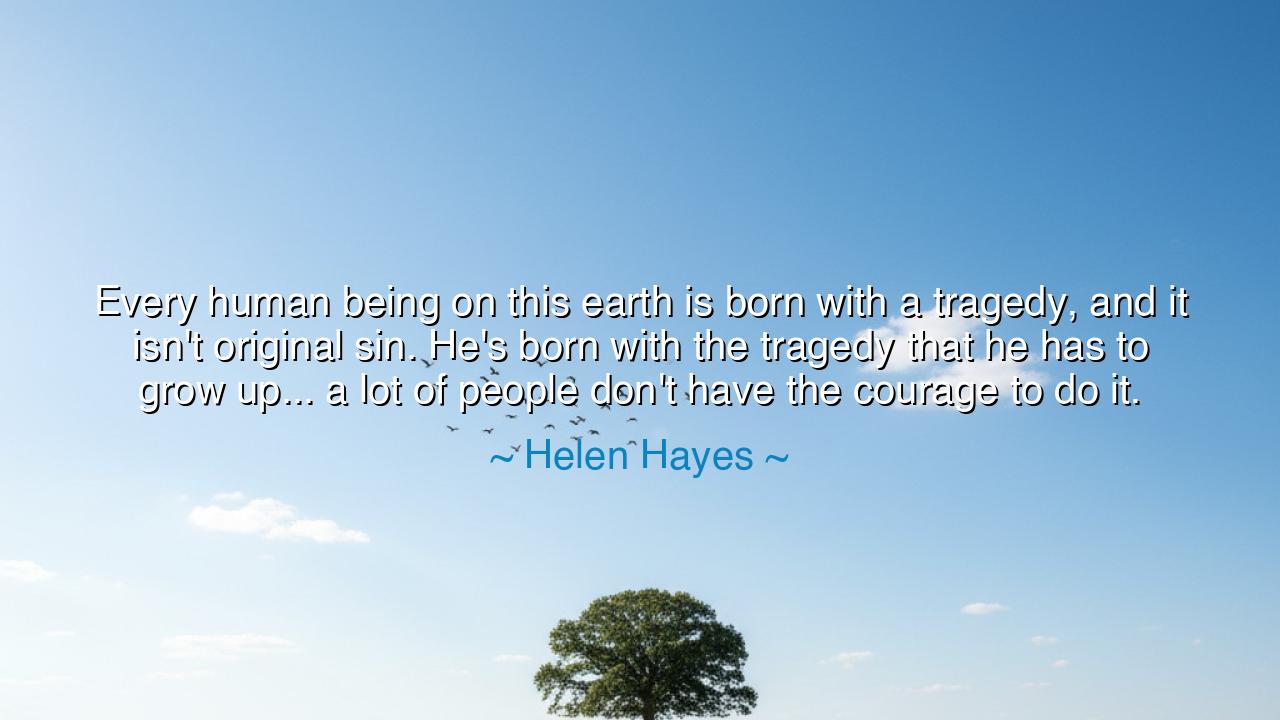
Every human being on this earth is born with a tragedy, and it
Every human being on this earth is born with a tragedy, and it isn't original sin. He's born with the tragedy that he has to grow up... a lot of people don't have the courage to do it.






“Every human being on this earth is born with a tragedy, and it isn’t original sin. He’s born with the tragedy that he has to grow up... a lot of people don’t have the courage to do it.” So spoke Helen Hayes, the First Lady of American Theater, whose words carry not the lightness of artifice but the gravity of truth. In this reflection, she speaks not of sin or punishment, but of the universal sorrow that shadows every human birth—the inevitable pain of growing up. For to grow up is not merely to age, but to awaken; it is to leave behind the innocence of childhood, to see the world as it is, and to choose to live with wisdom rather than illusion. And this, she says, requires courage—a rare and sacred courage that many never find.
Helen Hayes knew well the cost of maturity. She was a woman who faced loss, love, fame, and failure across the long arc of her life. Beneath the applause of her theater and film career lay the quiet suffering of a mother who lost her daughter, and a wife who endured long separations. From these experiences, she came to see that the tragedy of life is not evil or corruption—it is the fragile beauty of transformation. Every soul is born into innocence, but life demands that we grow—through loss, disappointment, and the breaking of illusions. Growth requires the death of the child within us, and death, in any form, is sorrow.
To grow up is to learn that the world is not always kind, that dreams are not always fulfilled, and that love sometimes ends in loss. It is to trade the simplicity of “everything will be all right” for the hard-won wisdom that “not everything will—but I will endure.” The tragedy lies in this awakening, for innocence cannot be reclaimed once truth has been seen. And yet, Hayes reminds us, this tragedy is not destruction—it is transformation. It is the making of the soul. The butterfly’s wings are born from the death of the caterpillar. Likewise, man’s strength is born from the death of his illusions.
Yet, as Hayes said, many do not have the courage to grow up. Some hide in perpetual childhood, clinging to comfort, fleeing responsibility, drowning in distraction. They fear the weight of truth and prefer the dream of safety to the risk of life. These are the ones who never learn to stand on their own feet, who seek always to be protected, praised, or excused. Their tragedy deepens into waste, for the heart that refuses to grow remains small, unable to contain either great sorrow or great joy. It is a terrible thing, to be old in years and yet unborn in soul.
Think of Prince Siddhartha, who became the Buddha. Surrounded by luxury, shielded from all suffering, he lived as a child though he was a man. But one day, he saw sickness, aging, and death—and his innocence shattered. That was the beginning of his true life. He left the palace of ignorance and set forth into the wilderness of understanding. Through pain and struggle, he grew—not upward into greatness as the world measures it, but inward into enlightenment. His story is the living mirror of Hayes’ words: to grow up is to face reality, to accept suffering as part of truth, and to find freedom within that acceptance.
Courage is the key that unlocks maturity. It is not the loud courage of battle, but the quiet courage to face oneself—to see one’s weakness, pride, and fear without fleeing from them. The child blames others; the grown soul takes responsibility. The child seeks happiness without cost; the grown soul learns that joy must be built from struggle. To grow up is to accept the loneliness of selfhood and yet to reach out in love to others who share the same burden. This courage is not given; it is forged, day by day, in the fire of living.
So let this be the teaching for all who seek to live deeply: Do not fear the tragedy of growing up. It is the tragedy that shapes your strength, the sorrow that deepens your wisdom, the storm that teaches you to stand. Embrace each loss as a lesson, each failure as a teacher, each burden as a sculptor shaping your soul. When you find yourself longing for the simplicity of childhood, remember that innocence may fade, but truth endures—and truth is the seed of peace. For as Helen Hayes teaches us, we are all born into the tragedy of growth, but in facing it with courage, we discover something far greater than innocence: the power to live as fully awake human beings.






AAdministratorAdministrator
Welcome, honored guests. Please leave a comment, we will respond soon